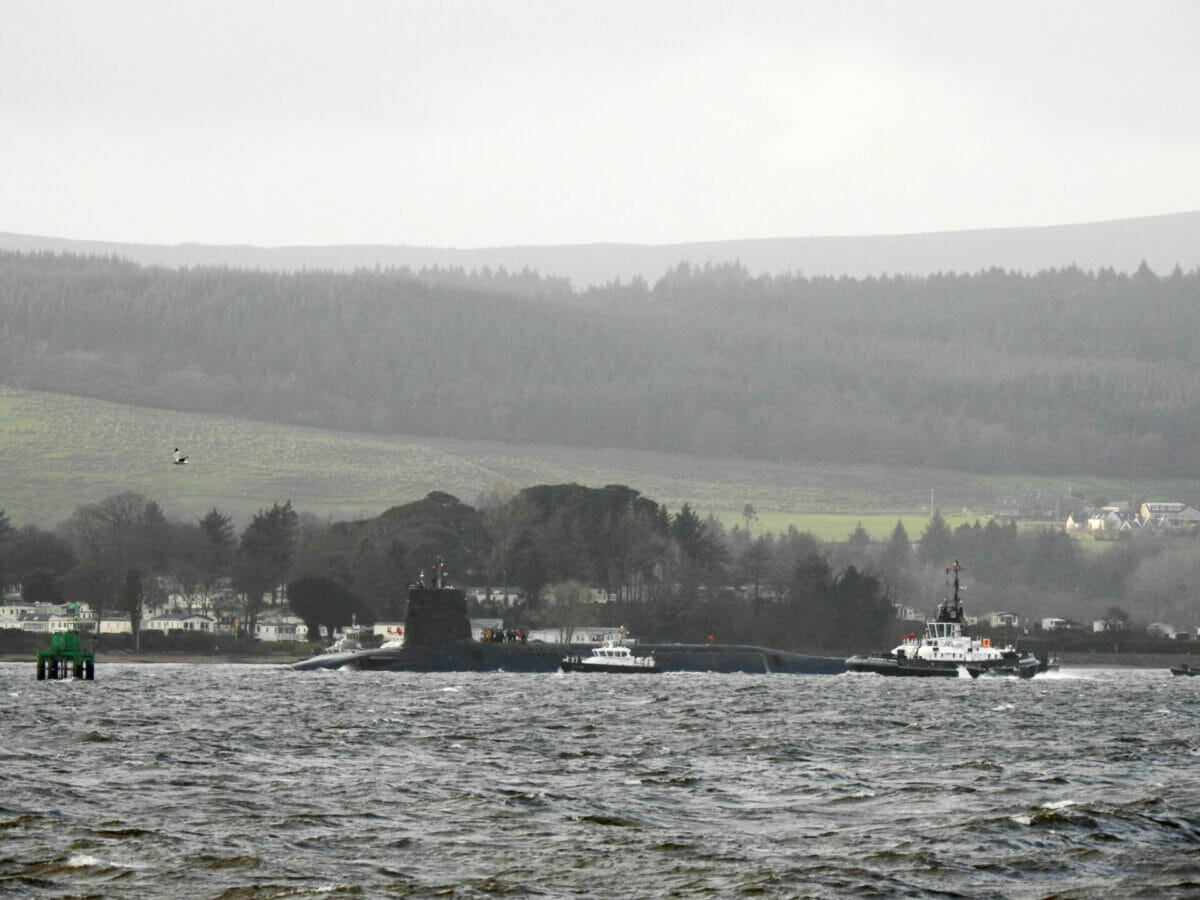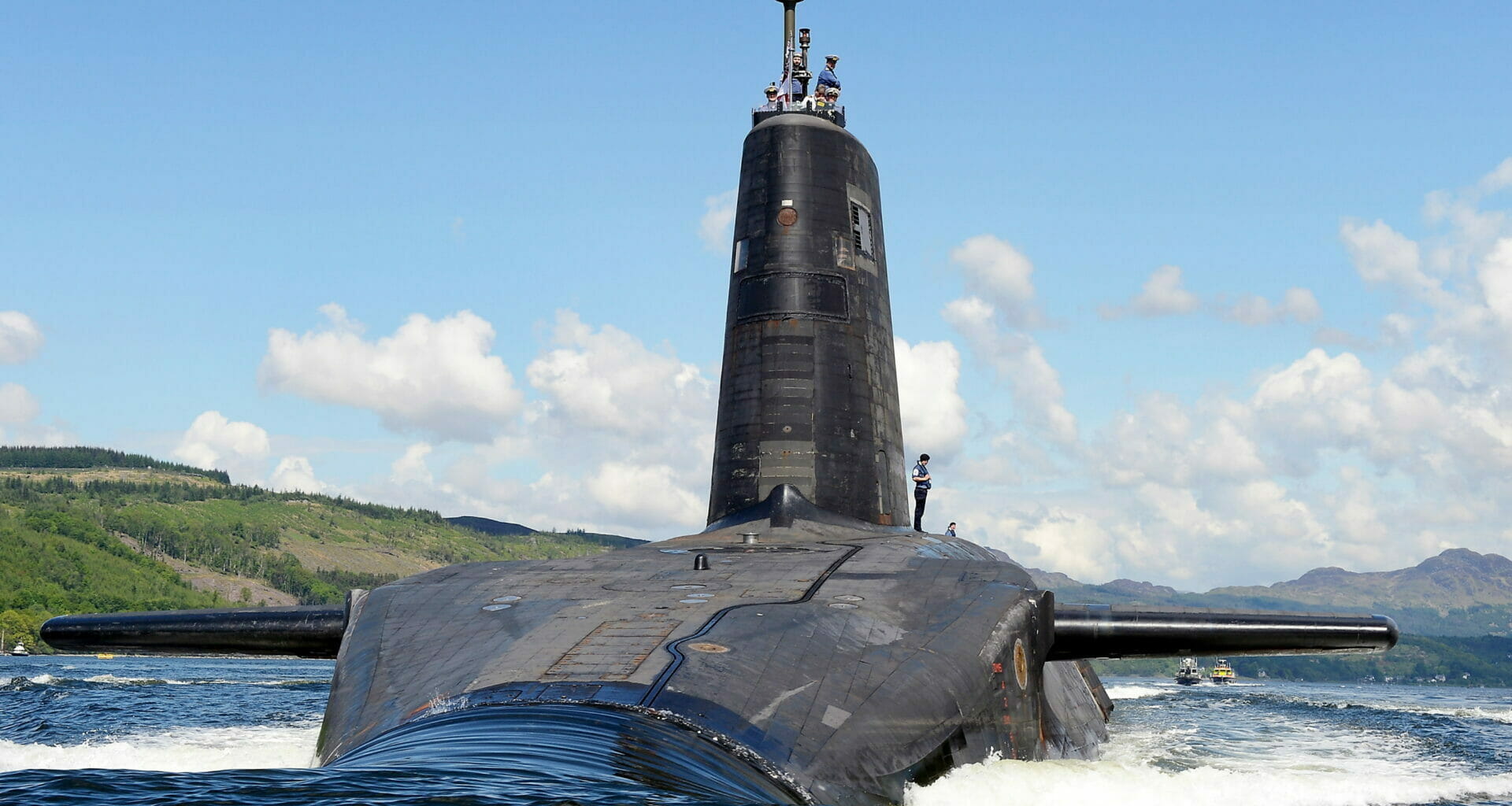New evidence that Trident submarines have been at sea for a record-breaking five months in 2022 has prompted a former submarine commander to warn of risks to nuclear safety.
Observations at the Faslane nuclear submarine base on the Clyde suggest that two submarines armed with Trident missiles each went out on patrol for 157 days, one from January to June and the other from May to November. That’s longer than submarines are previously known to have been at sea.
Rob Forsyth, who commanded nuclear submarines with the Royal Navy in the 1970s, said that the strains of such prolonged voyages caused “operating errors”, “a breakdown in morale” and posed “a direct threat to nuclear safety.”
Allegations of sexual harassment and drug misuse “could well be a consequence” of long patrols, Forsyth argued. Campaigners warned that the mental health of submariners would suffer and that accidents were more likely.
The Scottish National Party (SNP) described Trident submarines as “creaking and overstretched” and demanded “honesty and transparency” from the Ministry of Defence (MoD).
The MoD declined to comment on the length of patrols, but insisted that the operation of Trident submarines was “robust”. At least one nuclear-armed submarine was always at sea “keeping us safe”, it said.
UK Government policy, known as “continuous at sea deterrent”, requires that one of the country’s four Vanguard-class submarines, which usually carry Trident nuclear warheads, is always at sea. According to the Royal Navy, they “patrol the world’s oceans, silent, undetected and ready to strike at any time”.
But one of the submarines, HMS Vanguard, has been out of action and in maintenance for the last seven years following the discovery of a leak in an onshore test reactor at Dounreay in Caithness. It was formally handed back to the Royal Navy in July.
Reports in November said that another Trident submarine, HMS Victorious, had to return to Faslane for repairs after an electrical fire. The 29-year-old submarine was said to be “overdue a major refit”.
Vanguard submarines are due to be replaced by a new generation of Dreadnought submarines scheduled to enter service “in the early 2030s”, according to the MoD.

Throughout 2022 the campaign group, Nukewatch, has been monitoring the movements of Vanguard-class submarines in the Clyde. It has told The Ferret that one was at sea from 1 January to 6 June 2022, and another from 31 May to 3 November 2022.
Trident patrols seem to have been getting longer in recent years, but none have been known to stay at sea for as long as 157 days.
In 2021, a Trident sailor was court martialled for trying to drunkly force a woman to give him oral sex. His trial was reportedly told that he “had been deployed on the two longest recorded patrols on submarines in Royal Navy history with one lasting over 140 days”.
After the Falklands War in 1982-83, the nuclear-powered submarine HMS Warspite made the Guinness Book of Records for being at sea for what was then a record long time – 111 days.
‘Drop-off’ in nuclear safety standards
According to Forsyth, patrols he commanded in the 1970s never lasted longer than 60-70 days. In a blog for the nuclear policy think tank, the British American Security Information Council (BASIC), he has warned of the dangers of long periods submerged at sea.
He argued that “operating errors, flare-ups between crew members and disciplinary problems started to be a problem after about eight weeks”. With patrols now lasting over 150 days “it must be an even greater challenge to keep everyone mentally alert and sharp at their jobs,” he said.
“The great danger is that this unchanging routine, week after week, leads to boredom, complacency and an inevitable drop-off in standards.”
Forsyth pointed out that nuclear submariners are not subject to any psychological tests to check their suitability for prolonged periods at sea. The negative effects of cumulative pressures “must lead from time to time to a breakdown in morale”, he argued.
This would mean “loss of the respect and self discipline that is so important in a submarine both for harmonious living and, ultimately, in keeping the submarine and its nuclear weapon system safe.”
Recent allegations of drunken misbehaviour and drug misuse “could well be a consequence” of the stresses, he said. The very long submarine patrols now needed to ensure a continuous at sea deterrent could be “a direct threat to nuclear safety,” he added.
“Such threats could range from an operating error leading to a nuclear reactor meltdown, to a navigation error, to a missile incident in the worst case scenario.”
According to Forsyth, this was “a subject which the MoD will not acknowledge or discuss under the blanket of secrecy generally imposed on any information concerned with nuclear weapons or nuclear propulsion safety.”
The Ferret reported in July 2021 that the MoD had been allowed to keep annual reports about nuclear weapons safety secret, despite having released them for ten years under freedom of information law.
This is placing an intolerable strain on crews and the submarines themselves, and increasing the risk of accidents.
Jane Tallents, Nukewatch
The SNP’s defence spokesperson, Martin Docherty-Hughes MP, accused the MoD of an “undemocratic silence” on nuclear weapons. “This emerging evidence of the creaking and overstretched nature of Trident submarine patrols lays bare the unsustainable reality,” he said.
“The increased stress on the underlying assumptions of these patrols means that honesty and transparency with parliament and public on what they can expect from an ageing weapons platform is urgently required.”
Docherty-Hughes highlighted problems in the 1990s when Vanguard replaced Polaris submarines. “I would call on the UK Government to do everything it can to give more legitimacy to this transition process before it becomes an international scandal,” he said.
Nukewatch said its observations clearly showed that Trident submarines were now remaining under water for up to five months. “This is placing an intolerable strain on crews and the submarines themselves, and increasing the risk of accidents,” the group’s Jane Tallents, told The Ferret.
“The MoD is using the cloak of national security to cover up the dangers of this practice – and the disgraceful way in which Royal Navy personnel are being treated. If the MoD can’t run the UK’s nuclear weapons programme safely and responsibly, then they should not be running it at all.”
The British American Security Information Council warned that nuclear patrols were never meant to be so long. “But with one of Britain’s four Vanguard-class submarines out of commission for seven years due to refuelling delays, the burden on the remaining crews has become far greater,” said the council’s executive director, Sebastian Brixey-Williams.
“Spending up to five months submerged on patrol will undoubtedly have profound effects on nuclear submariners, harming physical and mental health, affecting crew discipline, and increasing the risk of nuclear incidents and accidents stemming from human error.”
A spokesperson for the Royal Navy said: “Since 1969 there has always been at least one Royal Navy nuclear-armed submarine at sea keeping us safe from the most extreme threats to our national security and way of life.
“Investigations are ongoing into allegations about sexual misconduct in the submarine service. This has not affected the operation of the deterrent and we strongly refute any suggestion that its operation is anything other than robust.”
The full blog by Rob Forsyth can be read here. This story was published in tandem with the Guardian.
Cover image thanks to the Ministry of Defence. Quotes from Forsyth were updated at 07.50 on 6 December 2022.















Is it now lawful to publish the comings and goings of our nuclear sub fleet? And whether they are fully armed or not.